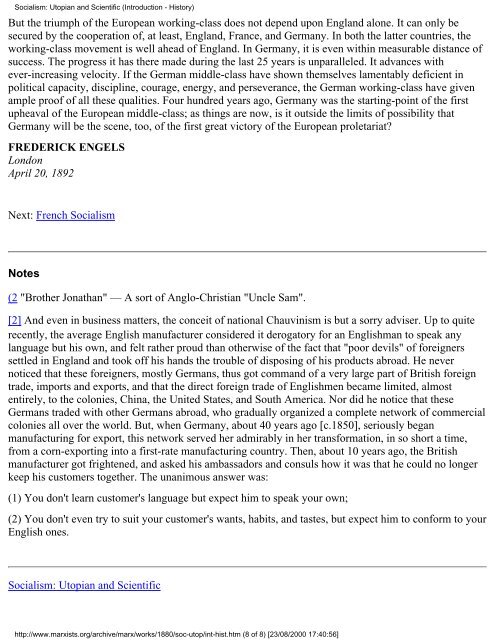<strong>Socialism</strong>: <strong>Utopian</strong> <strong>and</strong> <strong>Scientific</strong> (Introduction - History)But the triumph of the European working-class does not depend upon Engl<strong>and</strong> alone. It can only besecured by the cooperation of, at least, Engl<strong>and</strong>, France, <strong>and</strong> Germany. In both the latter countries, theworking-class movement is well ahead of Engl<strong>and</strong>. In Germany, it is even within measurable distance ofsuccess. The progress it has there made during the last 25 years is unparalleled. It advances withever-increasing velocity. If the German middle-class have shown themselves lamentably deficient inpolitical capacity, discipline, courage, energy, <strong>and</strong> perseverance, the German working-class have givenample proof of all these qualities. Four hundred years ago, Germany was the starting-point of the firstupheaval of the European middle-class; as things are now, is it outside the limits of possibility thatGermany will be the scene, too, of the first great victory of the European proletariat?FREDERICK ENGELSLondonApril 20, 1892Next: French <strong>Socialism</strong>Notes(2 "Brother Jonathan" — A sort of Anglo-Christian "Uncle Sam".[2] And even in business matters, the conceit of national Chauvinism is but a sorry adviser. Up to quiterecently, the average English manufacturer considered it derogatory for an Englishman to speak anylanguage but his own, <strong>and</strong> felt rather proud than otherwise of the fact that "poor devils" of foreignerssettled in Engl<strong>and</strong> <strong>and</strong> took off his h<strong>and</strong>s the trouble of disposing of his products abroad. He nevernoticed that these foreigners, mostly Germans, thus got comm<strong>and</strong> of a very large part of British foreigntrade, imports <strong>and</strong> exports, <strong>and</strong> that the direct foreign trade of Englishmen became limited, almostentirely, to the colonies, China, the United States, <strong>and</strong> South America. Nor did he notice that theseGermans traded with other Germans abroad, who gradually organized a complete network of commercialcolonies all over the world. But, when Germany, about 40 years ago [c.1850], seriously beganmanufacturing for export, this network served her admirably in her transformation, in so short a time,from a corn-exporting into a first-rate manufacturing country. Then, about 10 years ago, the Britishmanufacturer got frightened, <strong>and</strong> asked his ambassadors <strong>and</strong> consuls how it was that he could no longerkeep his customers together. The unanimous answer was:(1) You don't learn customer's language but expect him to speak your own;(2) You don't even try to suit your customer's wants, habits, <strong>and</strong> tastes, but expect him to conform to yourEnglish ones.<strong>Socialism</strong>: <strong>Utopian</strong> <strong>and</strong> <strong>Scientific</strong>http://www.marxists.org/archive/marx/works/1880/soc-utop/int-hist.htm (8 of 8) [23/08/2000 17:40:56]
<strong>Socialism</strong>: <strong>Utopian</strong> <strong>and</strong> <strong>Scientific</strong> (Chpt. 1)Fredrick Engels<strong>Socialism</strong>: <strong>Utopian</strong> <strong>and</strong> <strong>Scientific</strong>I[The Development of <strong>Utopian</strong> <strong>Socialism</strong>]Modern <strong>Socialism</strong> is, in its essence, the direct product of the recognition, on the one h<strong>and</strong>, of the classantagonisms existing in the society of today between proprietors <strong>and</strong> non-proprietors, between capitalists<strong>and</strong> wage-workers; on the other h<strong>and</strong>, of the anarchy existing in production. But, in its theoretical form,modern <strong>Socialism</strong> originally appears ostensibly as a more logical extension of the principles laid downby the great French philosophers of the 18th century. Like every new theory, modern <strong>Socialism</strong> had, atfirst, to connect itself with the intellectual stock-in-trade ready to its h<strong>and</strong>, however deeply its roots lay inmaterial economic facts.The great men, who in France prepared men's minds for the coming revolution, were themselves extremerevolutionists. They recognized no external authority of any kind whatever. Religion, natural science,society, political institutions — everything was subjected to the most unsparing criticism: everythingmust justify its existence before the judgment-seat of reason or give up existence. Reason became thesole measure of everything. It was the time when, as Hegel says, the world stood upon its head [1]; firstin the sense that the human head, <strong>and</strong> the principles arrived at by its thought, claimed to be the basis ofall human action <strong>and</strong> association; but by <strong>and</strong> by, also, in the wider sense that the reality which was incontradiction to these principles had, in fact, to be turned upside down. Every form of society <strong>and</strong>government then existing, every old traditional notion, was flung into the lumber-room as irrational; theworld had hitherto allowed itself to be led solely by prejudices; everything in the past deserved only pity<strong>and</strong> contempt. Now, for the first time, appeared the light of day, the kingdom of reason; henceforthsuperstition, injustice, privilege, oppression, were to be superseded by eternal truth, eternal Right,equality based on Nature <strong>and</strong> the inalienable rights of man.We know today that this kingdom of reason was nothing more than the idealized kingdom of thebourgeoisie; that this eternal Right found its realization in bourgeois justice; that this equality reduceditself to bourgeois equality before the law; that bourgeois property was proclaimed as one of the essentialrights of man; <strong>and</strong> that the government of reason, the Contrat Social of Rousseau, came into being, <strong>and</strong>only could come into being, as a democratic bourgeois republic. The great thinkers of the 18th centurycould, no more than their predecessors, go beyond the limits imposed upon them by their epoch.But, side by side with the antagonisms of the feudal nobility <strong>and</strong> the burghers, who claimed to representall the rest of society, was the general antagonism of exploiters <strong>and</strong> exploited, of rich idlers <strong>and</strong> poorworkers. It was this very circumstance that made it possible for the representatives of the bourgeoisie toput themselves forward as representing not one special class, but the whole of suffering humanity. Stillfurther. From its origin the bourgeoisie was saddled with its antithesis: capitalists cannot exist withoutwage-workers, <strong>and</strong>, in the same proportion as the mediaeval burgher of the guild developed into themodern bourgeois, the guild journeyman <strong>and</strong> the day-laborer, outside the guilds, developed into theproletarian. And although, upon the whole, the bourgeoisie, in their struggle with the nobility, couldhttp://www.marxists.org/archive/marx/works/1880/soc-utop/ch01.htm (1 of 10) [23/08/2000 17:41:05]














![tyf Enf=O=n]lgg](https://img.yumpu.com/47584932/1/190x245/tyf-enfonlgg.jpg?quality=85)

